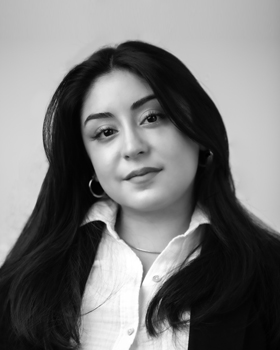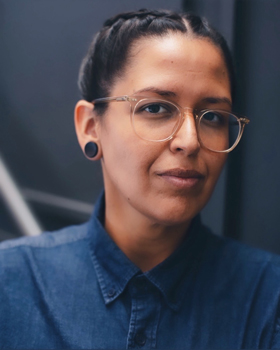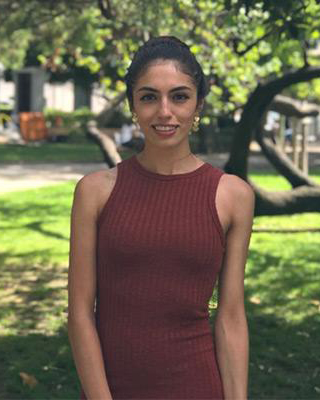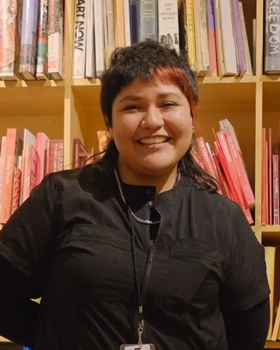
ASU-LACMA Master's Fellowship in Art History
Advancing a new generation of art museum leaders to create a more inclusive museum field
The ASU-LACMA Master’s Fellowship was founded in 2018 as a partnership between ASU and the Los Angeles County Museum of Art with the aim to culturally diversify the staff and leadership of art museums in the United States. The fellowship offers a three-year degree program that pairs rigorous academic instruction through traditional masters-level coursework with on-the-job work experience. This program supports a culturally diverse generation of museum professionals to promote inclusivity both in the museum and art history.
The fellowship
The fellowship allows staff already working at a participating museum to enroll in the master’s degree program in Art History at ASU. Museum employees take the classes via Zoom technology and participate in person and remotely in professional development activities.
Fellows have access to resources at the Los Angeles County Museum of Art, the Perez Art Museum Miami, the Heard Museum, the ASU Art Museum, the Phoenix Art Museum, the Memphis Brook Art Museum and ASU’s Herberger Institute, the largest comprehensive design and arts school in the United States.
Goals and benefits
- Culturally diversify the next generations of museum leaders.
- Accelerate the careers of museum professionals of color already working in museums.
- Lead radical change in the study and practice of art history and museum studies to be more inclusive.
- Create a professional network among participating museums and fellows.
- Diversify the curriculum in ASU’s art history and museum studies in much needed areas such as African American, Asian American, Indigenous, Latin American and Latinx art.
Eligibility requirements
Potential applicants must be employed at a participating museum for a minimum of one year. In addition, applicants must fulfill all admissions requirements for the MA in Art History degree, including a short essay describing the commitment to diversifying the museum field and expanding opportunities for the diverse voices and expression of a changing America to be represented in museum programming and leadership.
How to apply
- Apply to the School of Art's MA in Art History Degree by Jan. 15.
- Send the following required application materials to Angélica Afanador-Pujol, Program Director, MA/PhD (Art History), at [email protected] by Jan. 15.
- Fellowship essay
In 750 words or less, please describe your commitment to diversifying the museum field and expanding opportunities for the diverse voices and expression of a changing America to be represented in museum programming and leadership. - Supervisor approval form
Please complete the supervisor approval form and secure the signature of your employment supervisor to confirm your supervisor’s support and endorsement of your application. Please submit the approval form to the Director of the ASU-LACMA Fellowship program in the School of Art (address above) and the Human Resources department of your museum.
- Fellowship essay
Program components
Coursework
ASU's MA in art history is a comprehensive degree program designed to train students to engage with visuality in multiple ways. A diverse curriculum fosters critical understanding of aesthetics, production, patronage and consumption of art. Internationally recognized faculty members offer classes covering many cultures, time periods and geographies, using multiple approaches and methodologies. The program stresses intersections between disciplines and art in social and political contexts, and histories and theories of visual culture.
Fellows enroll in two graduate-level courses each semester. Course offerings in the art history curriculum include Ancient Greek and Roman, Asian, Contemporary, Global/Thematic Seminars, Latin American, Medieval, Modern, Pre-Columbian art, contemporary Indigenous art, African American and African Diaspora.
Additionally to the required art history courses, fellows can enroll in museum courses and in seminars offered outside the art history area or School of Art such as: American Indian Studies, Asian Pacific American Studies, African and African American Studies, Anthropology, Communication, Women and Gender Studies, Transborder Chicana/o and Latina/o Studies, Ethnic Studies, School of Sustainability, Global Studies, Philosophy, Center for the Study of Race and Democracy and more.
Mentorship
Each fellow is mentored by a seasoned museum professional outside of their home institution during the fellowship to provide individual counsel on graduate study, thesis and externship design, and ongoing career trajectory.
Thesis requirement
Under the guidance of a Thesis Committee, fellows write a thesis proposal during the second year and complete and defend their thesis in the third year. The thesis must demonstrate significant research abilities and methodological approaches.
Language requirement
Students must have a reading knowledge of one research language. The selected language needs to be appropriate for the area of research concentration and must be approved by the chosen faculty mentor. The requirement can be fulfilled by passing the Graduate Foreign Language Examination. Although it is highly recommended that students meet the foreign language requirement before beginning the program, many languages can be taken at ASU.
Travel and externship
Fellows are expected to travel to one to two convenings at ASU at the beginning of each semester and occasionally to one of the partner institutions.
Fellows participate in a customized weeklong externship at the end of their second year.
The externship is a summer travel opportunity for the fellows to either develop curatorial and thesis-related research, to work on a project with their mentor, or to travel on a professional development trip that will be focused on exploring a type of museum practice that will advance their careers, based on their professional and/or academic interests.
Who’s involved
Museum partners
The ASU-LACMA Master’s Fellowship was founded in 2018 as a partnership between ASU and the Los Angeles County Museum of Art. Since 2021, the partnership expanded to include the Heard Museum, the ASU Art Museum and the Phoenix Art Museum in Phoenix, Pérez Art Museum in Miami, and the Memphis Brooks Museum of Art. We welcome our newest partner, Scottsdale Museum of Contemporary Art. Museum partners employ fellows and cover travel expenses.
Current fellows

Velma Kee Craig joined the Heard Museum as an Andrew W. Mellon Fellow in 2017 and was hired as assistant curator in 2020. She is a textile artist and teaching artist, and she has produced short films and written poetry. She is a graduate of Arizona State University with a BA in English literature and a minor in American Indian studies. She has taught Diné weaving workshops with organizations such as the Heard Museum, Phoenix Indian Center, Sacred Youth Foundation and local school districts’ Native American programs. Her weavings have been exhibited as part of the exhibitions: "Celebrating Gifts from Spiderwoman’s Grandchildren," "WOVEN: The Art of Contemporary Native Weaving," "Connective Tissue," "WEAVE: construct. code. connect" and "Color Riot! How Color Changed Navajo Weaving." She has won awards for her short films "Interview with Einstein" and "in this manner, I am."

Hope Flores earned her BA in art history from California State University, Long Beach, in 2021. She has worked in the arts since 2015 and has previously held positions at the Museum of Latin American Art, Vincent Price Art Museum, LA Plaza de Cultura y Artes and Self Help Graphics & Art. Flores is an alum of the Getty Marrow Undergraduate Internship program and was notably the first community college student to earn a Mellon Undergraduate Curatorial Fellowship at LACMA in 2016–18. She returned to LACMA in late 2021 as a curatorial assistant in the Wallis Annenberg Photography Department. In her current role, she manages her department’s active acquisition program and has contributed to the recent exhibitions "Barbara Kruger: Thinking of You, I Mean Me, I Mean You." (2022); "City of Cinema: Paris, 1850–1907" (2022); and "Objects of Desire: Photography and the Language of Advertising" (2022). Flores intends to use her positionality as an ASU-LACMA Fellow to historicize the resurgence of experimental analog photography in contemporary Latinx and (post) Chicanx art.

Claudia López grew up on the borderlands known as Ciudad Juárez-El Paso. Her Indigenous identity is rooted in northern Mexico where her ancestors are from. López migrated to Phoenix as a young adult and obtained a BFA in photography from Arizona State University in 2018. In her current position as the bilingual communications specialist at PhxArt, López leads the museum’s bilingual initiative, helping the institution connect with the Spanish-speaking community. Her curatorial endeavors are centered in people and their stories, while her community-building efforts focus on indigenizing spaces, supporting transborder voices and unlearning Eurocentric and patriarchal narratives. As an ASU-LACMA Fellow, López intends to further her research of matrilineal preservation of ancestral knowledge, seeking to build a framework founded on Indigenous ways of thinking and one that acknowledges BIPOC identities outside of the binary.

Jackeline Lopez received her Bachelor of Arts in anthropology with honors from the University of California, Los Angeles (UCLA). She joined LACMA as an Andrew W. Mellon Undergraduate Curatorial Fellow in 2019 and was hired as a curatorial administrator in the Art of the Ancient Americas department in 2021. Lopez is a first-generation Latina from South Central Los Angeles who draws on her anthropological training to understand emic and etic power dynamics in museum spaces. Her goals as a scholar in the ASU-LACMA Fellowship are to investigate implicit cultural practices that expect and even prompt emerging BIPOC museum professionals to specialize in the very same curatorial areas that tokenize them and to help center Indigenous ontologies and narratives in Mesoamerican studies.

Ninabah Reid Winton graduated from ASU in 2016 with a BA in digital culture (music). Since then, she has worked on exhibitions at the Heard Museum and at Idyllwild Arts, including "Color Riot! How Color Changed Navajo Textiles" (2019) and "Looking at Us: Examining Institutional Critique" (2022). In 2022, Winton joined the curatorial department at the ASU Art Museum as an assistant curator. Her research interests lie in contemporary craft and design, contemporary North American Indigenous art, sound and audio art, textiles and fibers and material and craft economies. Winton is Diné (Navajo), and is based in downtown Phoenix.

Kristin Pedrozo is a double fellow at the Memphis Brooks Museum of Art (MBMA), holding the position of Art Bridges Curatorial Fellow and ASU-LACMA fellow. Born in the Philippines and raised in Memphis, Tennessee, Kristin received her studio art BFA at Rhodes College and is a graduate art history student through the ASU-LACMA fellowship. Pedrozo's curatorial position is tied to an Art Bridges Foundation-sponsored regional museum cohort focused on facilitating collection sharing and exhibition touring for museums across the American South, including Arkansas Museum of Fine Art, Birmingham Museum of Art, Fisk University Art Galleries and Mississippi Museum of Art. Additionally, she is the lead curator for the Summer and Winter Art Gardens, where she works with local artists to activate the museum's plaza, and a key contributor to the museum's $222 million new building project along the Mississippi River banks, designed by Pritzker Prize-winning architects Herzog and de Meuron.

Janessa Maria Melendez serves as the Lead Teaching Artist for Interpretive Media and Gallery Programs in the Education Department at Pérez Art Museum Miami. She has contributed to the institution through research and educational interpretive content writing, enhancing visitor engagement with the museum’s exhibitions. Melendez’s role has allowed her to develop and contribute to programs that have deepened her understanding of art, culture and community engagement. Before joining PAMM, Melendez worked extensively in early childhood and art education, which instilled a deep appreciation for learning and a commitment to fostering intellectual growth.

Jordan Tanguay is an emerging art historian whose research explores masculinities and camp aesthetics in eighteenth and nineteenth-century European art. He holds a BA in Art History from Eastern Washington University, where he received the Dean’s Student Excellence Award for his thesis on Cecil Beaton’s royal portraiture and queer appropriations of aristocratic imagery. His current research focuses on the intersections of gender, empire and aesthetic performance in fin de siècle Britain and France. With professional experience at the Los Angeles County Museum of Art (LACMA), Jordan has cultivated a deep interest in how public institutions can challenge dominant narratives by providing critical resources that transform societies over time. Drawing from his rural upbringing and a commitment to equity in the arts, his work aims to broaden public access to arts and education institutions. Through the ASU-LACMA Fellowship, Jordan plans to help shape more inclusive and intellectually rigorous museum spaces through both scholarship and leadership.

Koni Zhang is a Production Coordinator with a hybrid role in both the Graphic Design department and LACMA Productions at the Los Angeles County Museum of Art (LACMA). She is currently a second-year fellow in the ASU–LACMA Master’s Fellowship in Art History.
With a background in museum production, design and installation, Zhang coordinates print and media projects for exhibitions and artist film productions while pursuing academic research that bridges curatorial practice and visual culture studies. Her graduate work focuses on Japanese woodblock prints and modern comics, examining their transnational circulation since the 1970s and exploring how comics function as cultural artifacts through their materiality and form. She is passionate about integrating comics into museum collections and exhibitions to expand art historical narratives and diversify curatorial perspectives.

Oliver Sayers earned his BA in Museum Studies from Arizona State University in 2021. He joined the Scottsdale Museum of Contemporary Art in 2023 as the SMoCA Coordinator. In his role, Sayers manages organizational, administrative and communication duties, serves as a liaison with internal departments and assists with curatorial organization and exhibitions. As an ASU-LACMA Fellow, Sayers' research interests include experimental and contemporary art practices that, through various themes, intervene and engage with the public.

Fabiana Alexandra Sotillo was raised in Caracas, Venezuela, and moved to Miami in 2019 to pursue her BA in Art History at Florida International University (FIU), which she earned with honors in 2022. Her journey in the arts began in 2015, as a teenager, with an internship at Ranivilu Art Gallery. Since then, she has explored many realms of the art world, including art advisory, private collections, working as an artist assistant and interning at El Espacio 23 in Miami. In 2022, she joined Pérez Art Museum Miami (PAMM) as Curatorial Assistant. In her role at PAMM, she oversees exhibition didactics, coordinates publications and supports curators in realizing their exhibition projects. In the past two years, together with PAMM Director Franklin Sirmans, Sotillo co-curated two major exhibitions. As a Venezuelan immigrant, Sotillo is committed to using her role in the arts to amplify the voices of her Latin American community, viewing art as an expression of our shared humanity rather than fixed categories. As an ASU-LACMA Fellow, she intends to focus her research on the Venezuelan art world, aiming to highlight her country’s often-overlooked contributions to art history.

Mars Torres has been a museum professional since 2019. He holds a BA in Art History with a minor in Studio Art from Cal State San Bernardino. Mars has been the Visitor Services Coordinator at ASUAM since 2024 and previously held positions at SFMOMA and LACMA.
Past fellows
Becca Folkes-Lallo, 2025
Associate Director of Education
Memphis Brooks Museum of Art
Roshii Montaño, 2024
Curator
Heard Museum
Jayne Manuel, 2024
Collections Management Program Administrator
LACMA
Stephanie Rouinfar, 2024
Curatorial Administrator
LACMA
Mariama Salia, 2024
Program Specialist
LACMA
Emily Valdes, 2024
Assistant Registrar
Pérez Art Museum Miami
Deliasofia Zacarias, 2024
Snap Research Fellow
LACMA
Aurora van Zoelen Cortés, 2022
Curatorial Administrator
Art of the Ancient Americas, LACMA
Ariana Enriquez, 2021
Assistant Registrar
ASU Art Museum
Dhyandra Lawson, 2021
Curatorial Assistant, Wallis Annenberg Photography Department
LACMA
Celia Yang, 2021
Head of Director’s Strategic Initiatives, Asia
LACMA
Matthew Villar Miranda, 2021
Curatorial fellow
ASU Art Museum
Faculty
Internationally recognized faculty members in the history of art are joined each year by a dynamic mix of rotating visiting faculty and respected museum curators across the partner museums, who offer classes that span many cultures, time periods and geographies, using multiple approaches and methodologies. Meet the ASU art history faculty.
Program director
Museum curators
Each year a specialized seminar is taught by museum curators.
- 2018 Iranian Art: The Intersection of Past and Present (Linda Komaroff, LACMA)
- 2019 Daoist Art (Stephen Little, LACMA)
- 2020 Writing, Speaking and Collaborating in a Museum Context (Diana Magaloni, LACMA)
- 2023 Abrupt Intrusions: The Making of Modern Art in Korea (Virginia Moon, LACMA)
Program advisers
Michael Govan, Director, Los Angeles County Museum of Art
- Forrest Solis, Director, School of Art, Herberger Institute for Design and the Arts, ASU
Cristóbal Martinez, Director, School of Art, Herberger Institute for Design and the Arts, ASU
Program mentors
- Dakota Hoska, Associate Curator, Native Arts, Denver Art Museum
- Elysia Poon, Executive Director, School for Advanced Research - Indian Arts Research Center
- Andrea Hanley, Vice President of Programs, Native Arts and Culture Foundation
- Susana Tourella Leval, Former Director of El Museo del Barrio
- Chela Montoya, Assistant View President, Adult Education and Public Programs, Los Angeles County Museum of Art
- Alan Hernandez, Senior Curator, ASU Art Museum
Past mentors
- Clarissa Esguerra, Associate Curator Costumes and Textiles, Los Angeles County Museum of Art
- Erica Franek, Assistant Director, Registration and Collection Information, Los Angeles County Museum of Art
- Miki Garcia, Director, ASU Art Museum
- Julio César Morales, Senior Curator, ASU Art Museum
- Olga Viso, Senior Advisor on Global Arts Partnerships, Herberger Institute for Design and the Arts, ASU
- Maryam Ekhitar, Patti Cadby Birch Curator, Department of Islamic Art, The Metropolitan Museum of Art, New York
- Ben Garcia, Executive Director of the American LGBTQ+ Museum, New York
- Kelli Morgan, Professor of the Practice, Curatorial Studies, Director of Curatorial Studies, Tufts University, Boston
- Maria Elena Ortiz, Curator, The Modern, Fort Worth, Texas
- Zoe Kahr, Executive Director, Memphis Brooks Museum of Art, Memphis, Tennessee
- Diana Magaloni, Deputy Director, Program Director and Dr. Vurgunua Fields Curator of the Art of the Ancient Americas, LACMA
- Maura Reily, Director, Zimmerli Art Museum, Rutgers University
Public lectures
Navigating Change in Museums lecture series
The ASU-LACMA Navigating Change in Museums lecture series looks at diversity in museum practices. This series is free and open to the public.
Past lectures
- Diana Magaloni, Jan. 14, 2020, “The Florentine Codex & the Creation of the New World”
- Rita Gonzalez and Stephen Little, Aug. 26, 2019, “Art History in the Art Museum: A Curator’s Perspective”
- Amada Cruz, Miki Gracia and Tiffany Ana López, Nov. 27, 2018, “Roundtable Discussion on Diversity and Inclusion”
- Bryan Brayboy, Aug. 13, 2018, “Diversity and Inclusion in Higher Education”
- Chon Noriega, Aug. 13, 2018, “The Museum of the Future: Archives, Collections, Exhibitions, and Catalogs”
- Sharon Takeda, Aug. 13, 2018, “From Farm Girl to Museum Curator: The Story of One Asian-American”
In the news
Featured stories
From our blog
Buzz about ASU-LACMA
- LACMA Unframed: Meet the ASU-LACMA fellows
- ARTnews: How LACMA and ASU Are Charting a Path to the Top for the Next Generation of Curators of Color
- The State Press: Expanding the canon: how asu is working with museums to promote diversity
- ARTFORUM: LACMA and Arizona State begin academic program for museum professionals of color
- The Association of Art Museum Curators: A Possible New Future for Internships and Fellowships
- The New York Times: LACMA and Arizona State Join Forces to Help Curators of Color
- Artforum: LACMA and Arizona State begin academic program for museum professionals of color